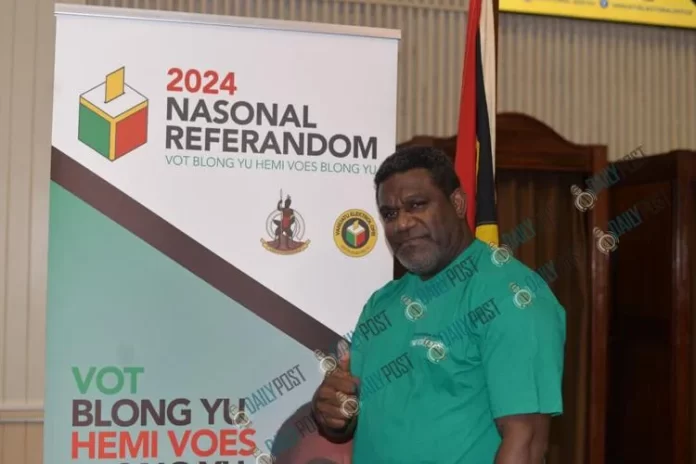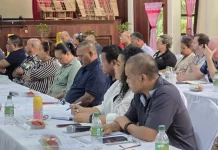Vanuatu Members of Parliament (MPs) are expected to receive financial support of up to VT1 million (US$ 8,343) each to strengthen and support the National Referendum ‘Yes’ campaign.
This was confirmed by the Minister of Internal Affairs, Johnny Koanapo, adding that this fund is part of the VT350 million (US$2.9 million) appropriated by Parliament for referendum awareness efforts.
Koanapo explained that MPs must submit a detailed work plan outlining their proposed strategies for conducting the awareness campaign for the ‘Yes’ vote.
The plan should present how the funds will be utilised, such as covering transportation expenses or organising community gatherings to spread information about the significance of the referendum.
Recognising the diverse needs of different constituencies, Koanapo appealed to the MPs to be realistic when budgeting within the submitted work plans. While some areas may require the full VT1 million (US$ 8,343) allocation, others might suffice with lesser amounts, based on their outlined strategies.
The Internal Affairs Minister confirmed efforts will be made to ensure all the people, with emphasis on reaching remote and sizable constituencies like Sanma and Malampa Provinces. Koanapo pointed out that MPs play an important role in supporting these particular government-led initiatives, filling gaps, and extending the campaign’s reach to areas beyond official efforts.
Koanapo explained that each MP will have their work plan to carry out in their constituencies. However, the government also disseminates information through the National Coordinating team spearheaded by the Ministry of Internal Affairs and invites MPs to join when they visit the MPs’ constituencies.
The MPs, according to their work plan can help disseminate information to areas the government might miss.
Minister Koanapo stressed that they want as much as possible to go to all areas, the constituencies in particular, to use the fund to help spread the message to the people.
The proposed amendments were passed by the parliament and the MPs take full ownership of the process to disseminate information.
He said MPs will go out to their constituencies to explain why the parliament has made this decision. MPs will also be in a better position to explain the amendments and the referendum.
Koanapo also mentioned that before the closing of the First Extraordinary Session last week, several presidents of political parties have pledged their support and called on their electorates to vote ‘yes’.
The minister added that they are aware that some people are campaigning against these plans. He questioned who they represent and suggested they declare their interests.
He reiterated that these people going for the ‘No’ campaign have the right to do so, but, they need clarify who they speak for.
The MPs have already agreed in Parliament that this change to the Constitution will stop MPs from changing sides easily. The minister said if anyone disagrees with the ‘Yes’ campaign, this indicates that they are okay with unstable governments and tolerate instability.
He called on those campaigning against the referendum to speak up when the awareness teams are going around to explain the referendum.
Koanapo made it clear that this change will not affect citizens’ fundamental rights, as stipulated in Article 5 of the Constitution, only MPs’ actions in Articles 17A and 17B of the Constitution.
Meanwhile, Chairman of the Electoral Commission, Edward Kaltamat, has explained the method for tallying votes in the upcoming referendum.
The Electoral Commission will determine the outcome based on a simple majority, which means 50 percent of the total votes cast, plus one additional vote. Kaltamat highlighted that this calculation includes all votes cast on the referendum day, both valid and void.
The referendum centres on two important questions outlined in Articles 17A and 17B, which aim to tackle the issue of political instability caused by frequent party allegiance shifts among MPs.
Article 17A mandates that MPs elected under a political party must maintain their party affiliation throughout their parliamentary term. If they resign or are expelled, their parliamentary seat will be declared vacant.
Similarly, Article 17B extends this requirement to independent candidates and members of single-member political parties, stipulating that they must affiliate with a political party post-election and maintain support throughout their term. Failure to comply will result in the forfeiture of their parliamentary seat.
These articles are part of the Constitution (Eighth) (Amendment) Act No. 21 of 2023, which was unanimously passed by Members of Parliament in December 2023. However, their implementation relies on the support of a national referendum, as outlined in Article 86 of the Constitution. Voters will be asked to vote on both Articles 17A and 17B, and their support will be determined on a national basis.
Kaltamat stated that if more than 50 percent of the voters support both questions for Article 17A and Article 17B, they will become law. However, if the majority vote against both questions, the referendum would fail, and neither article would be effective.
The Electoral Commission chairman emphasised the importance of voter participation, urging registered voters to exercise their rights on polling day. He stressed the significance of this inaugural referendum as an opportunity for citizens to shape the governance of the nation.
Kaltamat mentioned that amending the Constitution is not a simple task, and there is uncertainty about when another opportunity like this would arise for citizens to make such decisions.













